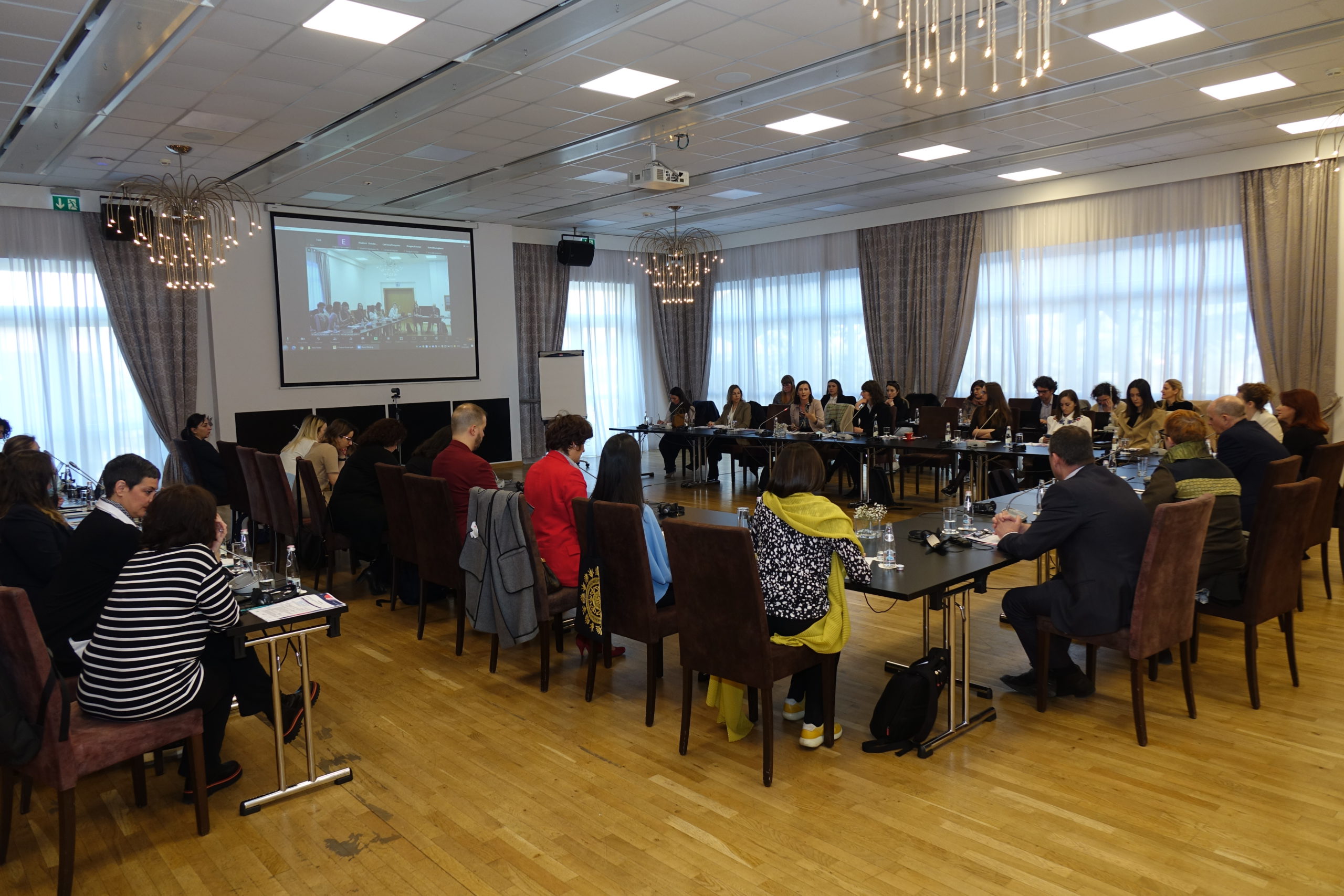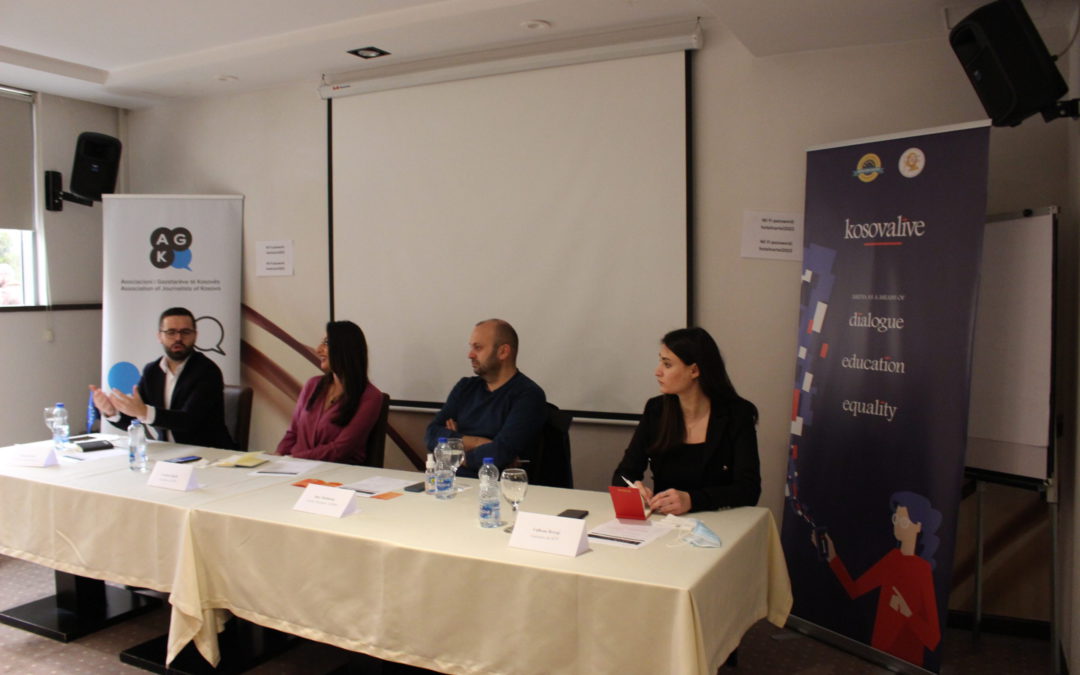3-4 March 2022: His Excellency Jason Ivory, Deputy Ambassador, British Embassy Tirana, Mr. Peter Brown, British Council Director for Western Balkans and Larisa Halilovic, Media for All Team Leader, opened the Media for All Programme event, bringing together Albanian speaking journalists from across the Western Balkans to discuss challenges to media freedom and the opportunities to amplify their voices by working together.
More than 30 journalists and experts from Albania, Kosovo, Bosnia and Herzegovina, Montenegro, Serbia, and North Macedonia discussed safety of women journalists, anti-SLAPP policies and actions, working conditions, as well as mentoring and development opportunities during the two-day event.
Participants and panellists explored challenges to safety of women and men journalists, opportunities to transform roles and visibility of women in the media and explore networking approaches across the region. The event opened space for young women journalists to share their experiences, stories, concerns and priorities. Together, all the participants explored the potential for strengthening existing and establishing new networks of women in media, with focus on activism, support and solidarity. Initial commitments were made for the first steps towards establishing networking initiatives in Albania, Kosovo, Montenegro and North Macedonia.
They key conclusions were:
- Safety of women, men and underrepresented groups in media is not optional, but mandatory. Violence should not be acceptable nor normalized. All of us have the responsibility of helping empower journalists to ensure and maintain their safety and security.
- Work on gender policies, introduction of mentoring, and strengthening of professional networks lead to personal and professional empowerment of women in media and should be made available on an ongoing basis
- Journalists across the Western Balkans agree that networking is needed. Establishing, connecting and strengthening networks of women in media locally and regionally can enhance solidarity and amplify voices of women in media coming together around common issues. Answering to this need journalists from Albania, Kosovo, Montenegro and North Macedonia expressed readiness and commitment to establishing networks in their countries
DHM Jason Ivory, British Embassy in Tirana said: “We are here to talk about the power of networking, in-country, across the region and to explore how we can enable exchange and networking among women journalists. Strong professional networks bring journalists together around their mission to inform objectively their readers, while keeping safe and working independently.
We can make a difference by coming together. The Media for All programme has opened that space today, to look into the challenges you all share in your countries
and consider the networking as a resource for peer support, collaboration, making connections, and working together towards empowerment.”
Larisa Halilović, Media for All Programme Team Leader, commented: “Establishing, connecting, and strengthening networks of women in media locally and regionally can enhance solidarity and amplify voices of women in media. By coming together, we are able to focus on common issues, including those of physical, online, and workplace
safety. Throughout this networking event we heard strong voices of women journalists and activists of all generations from across the region ready to address common challenges and discuss possible solutions. I am very pleased to see the commitment to networking of women in media confirmed in Albania, North Macedonia, Montenegro and Kosovo. That is an important step towards gender equality and visibility.”
Additional information:
- Through the Media for All programme, journalists and editors engage in discussions and peer-to-peer learning on current status of the gender equality, equity, work parity, representation and safety of men and women journalists and editors and share our knowledge, tools, and skills in addressing the gender inequalities.
- M4A is trying to provide the level playing field for women and minorities in media professions and enable them to have same chances at all ranks of the profession. Women in media should be invited to express their views as experts, active members of society and as members of the audience.
- Women and men journalists share pressures and risks of the profession, yet women journalists are exposed to risks – because they are women – that their male colleagues are spared of. Our work on integrating gender concerns into the talks on safeguarding men and women in the field, in the newsroom and in on-line spaces improves the safety of all employees.
- Our work on policies, mentoring, and strengthening networks of support gives important tools for personal and professional development of women working in media and should be available on an ongoing basis in media outlets.
- Mechanisms of support such as policies, mentoring and networking will lessen gender inequalities, but they are not enough. We all, men and women journalists and editors have responsibility to ensure that gender divisions are addressed and equality and equity implemented in practice.
- The British Council is working in partnership with the Balkan Investigative Reporting Network (BIRN), Thomson Foundation and INTRAC (The International NGO Training and Research Centre) on the Media for All programme funded by the UK Government.
- Media for All is providing tailored business development support, enhancing two way communications between citizens and media outlets, supporting youth media outlets and young journalists and addressing gender gaps and divisions as
impediment to development. The Media for All programme is working with journalists, editors, owners and audiences across the Western Balkans (Albania, Bosnia and Herzegovina, Kosovo, Montenegro, North Macedonia and Serbia)
Ends
Notes to Editors
- The Media for All programme works with journalists, editors, owners and audiences across the Western Balkans (Albania, Bosnia and Herzegovina, Kosovo, Montenegro, North Macedonia and Serbia). We are supporting media outlets to be more financially and structurally resilient, improve gender equality in the workplace, and enable them to produce more quality, relevant, gender sensitive content that attracts and engages new audiences, including women, young people and marginalised groups. (Media for All | British Council)
- The British Council is the UK’s international organisation for cultural relations and educational opportunities. We build connections, understanding and trust between people in the UK and other countries through arts and culture, education and the English language. Last year we reached over 80 million people directly and 791 million people overall, including online, broadcasts and publications. Founded in 1934 we are a UK charity governed by Royal Charter and a UK public body. We receive a 15 per cent core funding grant from the UK government.










